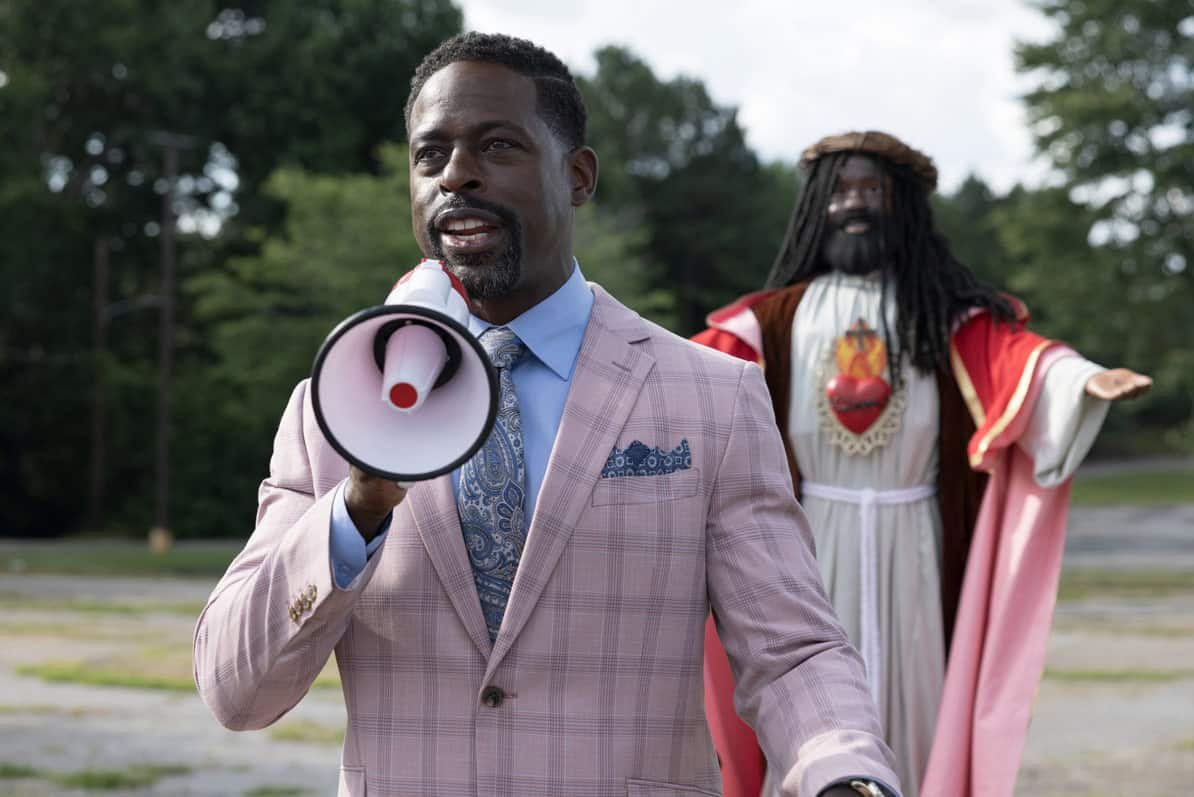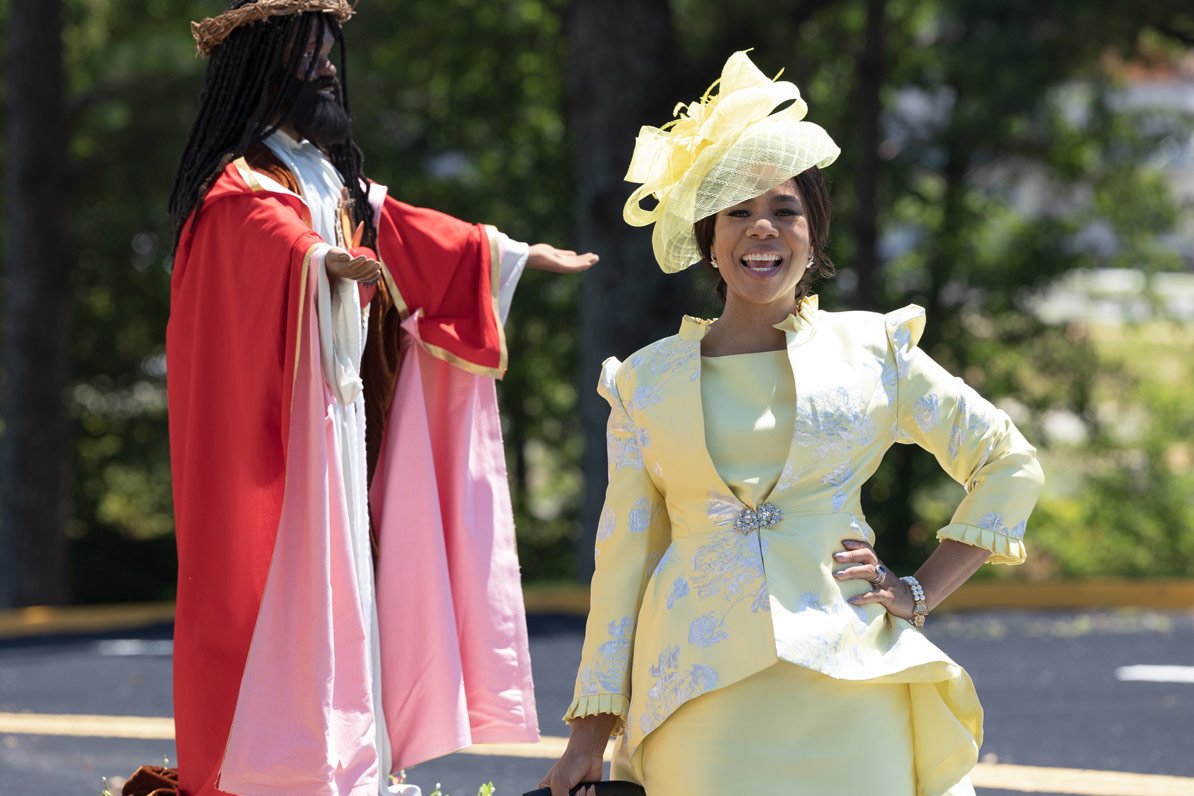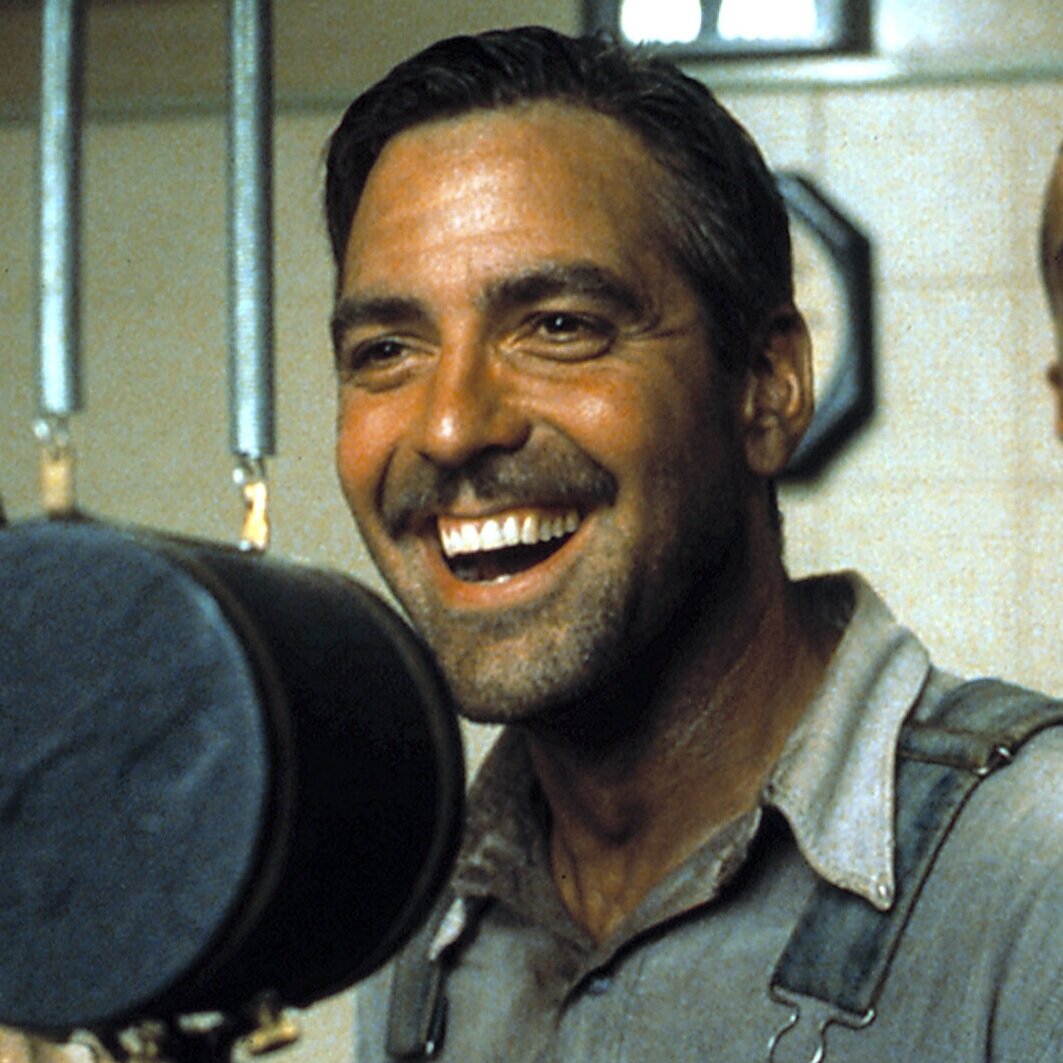For the First Time Ever, Christianity Is the Butt of a Joke,Thanks to ‘Honk for Jesus, Save Your Soul’
If you were driving down a highway and saw a sign that said “Honk for Jesus” would you honk? Would you go to a church that advertised itself? Would you even go to a church that was located on a highway? Despite being non religious, I considered these questions while watching the climax of Honk for Jesus, Save Your Soul, directed by Adamma Ebo, as Trinitie Childs practically begs the passersby to honk for her sanity (and Jesus). In her directorial debut, Ebo has created a dark satire about the lives of millionaires Trinitie (Regina Hall) and her husband, Lee-Curtis Childs (Sterling K. Brown), following what they claim is a big tragedy in their lives. The Childs are reeling from the closure of their megachurch due to misconduct allegations against Lee-Curtis. In an attempt to clean up their image, Trinitie and Lee-Curtis decide to hire a documentary team to follow them around as they prepare to open up Wander to Greater Paths Baptist Church after several years of closure.
Honk for Jesus, Save Your Soul is advertised as a comedy; you’ll find yourself laughing during the trailer, but as you sit in the theater, almost no laughing occurs. Instead, this mockumentary has large tints of darkness to highlight the highly questionable nature of the documentary at hand. As the camera effortlessly shifts from documentary mode to drama mode (each with unique cinematography and camera angles), viewers see the drastically different personas of Trinitie and Lee-Curtis Childs and who they have become as a result of their success. This highlights both the hypocrisy of Christianity as a religion and people in general, who claim that wealth doesn’t change a person.
Right off the bat, the film pokes fun at the importance and prevalence that Christianity is granted in Atlanta, Georgia. Trinitie is referred to as “the First Lady” with the Childs appearing on television frequently due to their monetary donations. They use their wealth to buy relevance into Atlanta’s politics, boosting their self-importance to government level despite the lack of any concrete power. However, the public eats it right up, with community members and newscasters alike speaking of the pair in reverence.
Over the course of the rest of the film, the satire is expertly layered to a “blink and you’ll miss it” level. From the beginning, Lee-Curtis and Trinitie Childs are very open about their wealth; they pride themselves on the success that Christianity has brought them. However, in the mere acknowledgement of the fact that they have a separate walk-in closet the size of a bedroom at the church, the couple rebukes the very foundation of Christianity: the fact that it is supposed to be a belief system to help the guidance of one’s life, not something that you use for personal gain. Perhaps Trinitie’s best line is: “There is just something about a pastor in Prada.” Through footage of past sermons, we even see Lee-Curtis dismissing his wealth as anything but materialistic by claiming it came to him through “investing in God”, reinforcing the very un-Christian nature of the couple. In general, through the sexual abuse allegations against Lee-Curtis, the couple’s condescending behavior towards others and unwillingness to cooperate with their rival church, and the frequent switching of personalities when the couple is off-camera, Honk for Jesus Save Your Soul successfully calls attention to the hypocrisy of Christianity by emphasizing the Childs’ lack of compassion, respect, and altruism (core Christian values) and covering up for it it with the tradition of over-preaching.
As mentioned before, this film boasts two different camera and narrative settings. There is documentary mode, which features most of the limited comedy, and drama mode, when the cameras shift and the Childs’ real personalities come out. When on camera, both Trinitie and Lee-Curtis are straining to seem like the perfect couple whose relationship is still intact despite the abuse allegations. They are full of smiles and jokes, trying their best to ignore the reason for the documentary and instead focusing their energy on reopening the church. Their efforts to disregard the recent events and make conversation with Anita (their director) as normal is comical. When you see Trinitie’s artificial smile for the umpteenth time, the second-hand embarrassment and pity is unavoidable. Of course, we can’t forget about Lee-Curtis. There is no shortage of Brown’s magnetic megawatt smiles in this film as he maintains his “innocence” despite very obviously confirming that the allegations are, in fact, valid.
When the “cameras” are turned off, however, and the film transitions to the traditional widescreen format, viewers see the real Childs couple. The couple that curses openly along to rap lyrics to blow off steam, maintains an unhealthy relationship by making subtle digs at each other, and prides themselves on the superiority they hold over others. The rifts in the Childs’ relationship is evident, but only when in drama mode when perfection isn’t real. The best example of this is when Lee-Curtis compares his will to win to Rocky Balboa (from Rocky) and Trinitie knocks Lee-Curtis down a few pegs by responding “But Rocky didn’t win” followed by her refusal to use a knife on his grandmother’s china. The uncomfortable scraping is her version of getting a leg up in the situation; without actually speaking, she is voicing her displeasure at the entire situation. The documentary about their comeback was his idea, and it's his fault entirely that they need to make a comeback.
Despite having some plot holes and a rushed ending, what really shone through as the star of Honk For Jesus Save Your Soul was the spectacular acting and authenticity of Sterling K. Brown and Regina Hall. Independently, each actor nails their respective character traits. Within the film, it’s safe to say that Lee-Curtis Childs is the worst. However, as you experience the tide of the movie, viewers will find themselves both hating him and rooting for the success of his church. That is the sign of an extremely talented actor. Of course, part of it is Brown’s undeniable charisma and likability, both on-screen and off-screen. Regardless, Brown expertly portrays both Lee-Curtis’ fake and valid naivité. His naivité is fake in the sense that he thinks he’ll be able to get away with the sexual abuse violations, despite actually confirming it in his documentary. On the other hand, his naivité is real in the sense that he authentically believes that he’ll be able to draw back his congregants that departed his church upon the news of the allegations. Even as it becomes abundantly clear that their plan to reopen is failing, he maintains that he “is not going anywhere”.
Now, not to forget the real star, Regina Hall has been known for her comedic talent (Girl’s Trip), but has recently been able to express her full range and prowess on screen with this film and her January 2022 horror film, Master. As mentioned earlier in the article, Hall is outstanding in expressing pleasure to mask her growing discomfort in remaining married to Lee-Curtis. When filming their documentary, her perkiness is obviously forced, but as soon as she tells Anita to stop filming, Hall allows the smile and happiness lines around her eyes to slowly melt off her face, the last stop being her bright white teeth. Eventually the two personalities begin to blend and Trinitie cannot help but stop forcing the happiness while filming.
As the film progresses, Trinitie begins to fall apart and Hall couldn’t be better in expressing the devolving behavior of Trinitie. By the end, when Lee-Curtis forces her to wear bright white face paint on the highway to advertise for their church, you can see the insanity building in her eyes until it finally takes over and she runs away. Even in her final moments, Trinitie maintains her Christian values as she says she “would sooner kill [Lee-Curtis] than leave him”, but you can see her brokenness inside. No one else could have played Trinitie to such perfection than Hall. Of course, the entire film depends on the chemistry between Hall and Brown, which does not disappoint. The tension between the couple is obvious within the first few minutes of the film, but it slowly builds throughout the film until their relationship explodes in their final confrontation after the face paint episode. At this point in the film, it is obvious that their entire project of filming their “comeback” was a disaster, and it is evident on both of their faces.
Overall, the film is very clever in sending its message. Almost immediately, viewers know that it will continually make fun of Christianity, as well as the overbearing role that religion in general plays in our lives, even for those who are unreligious. But despite Adamma Ebo’s talent in directing, there were some holes in the script. For example, there is no backstory provided on Lee-Curtis’ scandal, which is the cause for the entire movie. What made him decide to take those actions? What were the immediate consequences from the breaking news besides the closing of his church? Personally, I would have liked less of the mockumentary and more of the film dedicated to character development, including for Trinitie. Regina Hall gave the character tremendous potential, but she ended up being overshadowed by Lee-Curtis’ demanding presence. There are several moments where Trinitie’s past is mentioned: her originally not being a Baptist and when we meet Trinitie’s mother, but both scenes were cut short. I would have liked to know how Trinitie and Lee-Curtis met and who she used to be.
Finally, the ending was completely rushed. The entire film was building up to the reopening of Wander to Greater Paths, and once we get there, the film ends. Viewers never even find out if congregants end up wandering back to the church. Maybe Ebo intended for this, leaving viewers to come up with their own ending, but I would have preferred something finite.
Despite these main critiques, I can honestly say that I loved this movie. In an age where religion (Christianity) and politics are too intertwined for my liking, I was relieved when I finally saw a movie discussing the hypocrisy of the religion. While this film could have been an extremely funny movie, I agreed with Ebo’s ultimate decision to turn it into a dark satire with pieces of comedy to draw attention to the unfortunate effects religion has on society. Had this movie been a laugh-out-loud comedy, the overall message would have been lost. If the phenomenal acting by Sterling K. Brown and Regina Hall isn’t enough to draw you to the theater (or your couch), keep this in mind: if you need a break from religion, this film is perfect for you.
Honk for Jesus Save Your Soul is available in theaters and for streaming on Peacock.
Popular Reviews


































